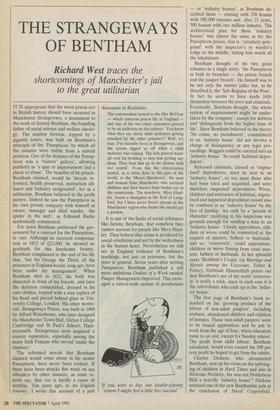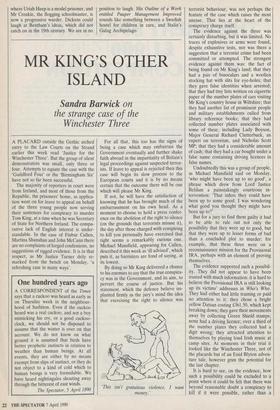THE STRANGEWAYS OF BENTHAM
Richard West traces the shortcomings of Manchester's jail to the great utilitarian IT IS appropriate that the worst prison riot in British history should have occurred in Manchester Strangeways, a monument to the work of Jeremy Bentham, the founding father of social science and welfare ideolo- gy. The sombre fortress, topped by a gigantic tower, was built on Bentham's principle of the 'Panopticon' by which all the inmates were visible from a central position. One of the features of the Panop- ticon was a 'visitors' gallery', allowing publicity as 'a spur to improvement and a check to abuse'. The benefits of his prison, Bentham claimed, would be 'morals re- formed, health preserved, instruction dif- fused and Industry invigorated', for as a utilitarian, Bentham believed in the profit motive. Indeed he saw the Panopticon as his own private company with himself as owner, manager and chief warder, 'the spider in the web', as Edmund Burke sardonically commented.
For years Bentham petitioned the gov- ernment for a contract for the Panopticon, in vain. Although he received compensa- tion in 1813 of £23,000, he showed no gratitude for this handsome bounty. Bentham complained to the end of his life that, 'but for George the Third, all the prisoners in England would, long ago, have been under my management'. When Bentham died in 1832, his body was dissected in front of his friends, and later the skeleton reassembled, dressed in his own clothes, topped with a wax replica of his head and placed behind glass in Uni- versity College, London. His other memo- rial, Strangeways Prison, was built in 1868 by Alfred Waterhouse, who later designed the Manchester Town Hall, Girton College Cambridge and St Paul's School, Ham- mersmith. Strangeways soon acquired a sinister reputation, especially among the many Irish Fenians who served 'under the chimney'.
The reformed morals that Bentham claimed would come about in his model Panopticon, have never been evident. If there have been attacks this week on sex offenders by other inmates, as some re- ports say, that too is hardly a cause of surprise. Ten years ago, in An English Journey, I wrote this account of a pub discussion in Rochdale: The conversation turned to the film McVicar — which concerns prison life in England and one of the two other customers proved to be an authority on this subject: 'You know what they say about child molesters getting attacked by the other prisoners? Well, it's true. I've recently been in Strangeways, and the screws tipped us off when a child molester was coming. The lads poured water all over his bedding to stop him getting any sleep. They beat him up in the shower with wet towels'. From this the conversation turned, as it often does in this part of the world, to the 'Moors Murderers', the man and woman from Manchester who tortured children and then buried their bodies out in the countryside. The murderer, Myra Hind- ley, found a champion in the Earl of Long- ford, but I have never heard anyone in the Manchester region who thinks she should get a pardon.
It is one of the faults of social reformers like Jeremy Bentham, that somehow they cannot account for people like Myra Hind- ley. They believe that crime is produced by social conditions and not by the wickedness in the human heart. Nevertheless we still see in England evidence of Bentham's teachings, not just on prisoners, but the poor in general. Seven years after writing Panopticon, Bentham published a still more ambitious Outline of a Work entitled Pauper Management Improved. This envis- aged a nation-wide system of poorhouses
'If you were to buy our double-glazing system I might feel a little less suicidal.'
— or 'industry houses', as Bentham de- scribed them — starting with 2513 houses with 500,000 inmates and, after 21 years, 500 houses with one million inmates. The architectural plan for these 'industry houses' was almost the same as for the Panopticon prison, that is, 'circularly poly- gonal' with the inspector's or warder's lodge in the middle, letting him watch all the inhabitants.
Bentham thought of his two great schemes as a single unity: 'the Panopticon in both its branches — the prison branch and the pauper branch'. He himself was to be not only the master jailer but, as he described it, the 'Sub-Regulus of the Poor'. In fact he seems to have made little distinction between the poor and criminals. Eventually, Bentham thought, 'the whole system of imprisonment might be under- taken by the company', except for debtors and 'delinquents from the higher lines of life'. Since Bentham believed in the theory 'No crime, no punishment', commitment to an 'industry house' did not involve a charge of delinquency or any legal pro- ceedings. Beggars could be coerced into an 'industry house'. So could 'habitual depre- dators'.
Released criminals, classed as 'stigma- tised' depredators, must be sent to an 'industry house'; so too must those who had been tried and acquitted, and were therefore 'suspected' depredators. Wives, children and mistresses of habitual, stigma- tised and suspected depredators would also be confined in an 'industry house' by the fact of kinship. An oath by a 'person of character' testifying to his suspicions was grounds enough for sending a man to an 'industry house'. Unruly apprentices, chil- dren or wives could be committed at the request of masters, fathers or husbands, and so, 'conversely', could apprentices, children or wives fleeing from cruel mas- ters, fathers or husbands. In her splendid essay 'Bentham's Utopia' (in Marriage and Morals among the Victorians. Faber & Faber), Gertrude Himmelfarb points out that Bentham's use of the word 'converse- ly' is really a trick, since in each case it is the subordinate who ends up in the 'indus- try house'.
The first page of Bentham's book re- marked on the 'growing produce of the labour of non-adult paupers', including orphans, abandoned children and children of inmates. These 'non-adult paupers' were to be bound apprentices and be put to work from the age of four, when education came to an end, except for Sunday school. The profit from child labour, Bentham calculated, would even exceed the 300 per cent profit he hoped to get from the adults.
Charles Dickens, who abominated Bentham, sent up his views on the upbring- ing of children in Hard Times and also in Nicholas Nickleby, for was not botheboys Hall a real-life 'industry house'? Dickens satirised one of the new Benthamite jails at the conclusion of David Copperfield,
where Uriah Heep is a model prisoner, and Mr Creakle, the flogging schoolmaster, is now a progressive warder. Dickens could laugh at Bentham's ideas, which did not catch on in the 19th century. We are in no position to laugh. His Outline of a Work entitled Pauper Management Improved sounds like something between a Swedish hostel for children in care, and Stalin's Gulag Archipelago.



























































 Previous page
Previous page